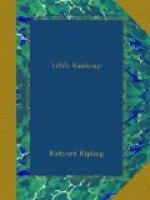They gave a dinner to celebrate the event. The Lushkar team came, and Dirkovitch came, in the fullest full uniform of a Cossack officer, which is as full as a dressing-gown, and was introduced to the Lushkars, and opened his eyes as he regarded. They were lighter men than the Hussars, and they carried themselves with the swing that is the peculiar right of the Punjab Frontier Force and all Irregular Horse. Like everything else in the Service it has to be learnt, but, unlike many things, it is never forgotten, and remains on the body till death.
The great beam-roofed mess-room of the White Hussars was a sight to be remembered. All the mess plate was out on the long table—the same table that had served up the bodies of five officers after a forgotten fight long and long ago—the dingy, battered standards faced the door of entrance, clumps of winter-roses lay between the silver candlesticks, and the portraits of eminent officers deceased looked down on their successors from between the heads of sambhur, nilghai, markhor, and, pride of all the mess, two grinning snow-leopards that had cost Basset-Holmer four months’ leave that he might have spent in England, instead of on the road to Thibet and the daily risk of his life by ledge, snow-slide, and grassy slope.
The servants in spotless white muslin and the crest of their regiments on the brow of their turbans waited behind their masters, who were clad in the scarlet and gold of the White Hussars, and the cream and silver of the Lushkar Light Horse. Dirkovitch’s dull green uniform was the only dark spot at the board, but his big onyx eyes made up for it. He was fraternising effusively with the captain of the Lushkar team, who was wondering how many of Dirkovitch’s Cossacks his own dark wiry down-countrymen could account for in a fair charge. But one does not speak of these things openly.




